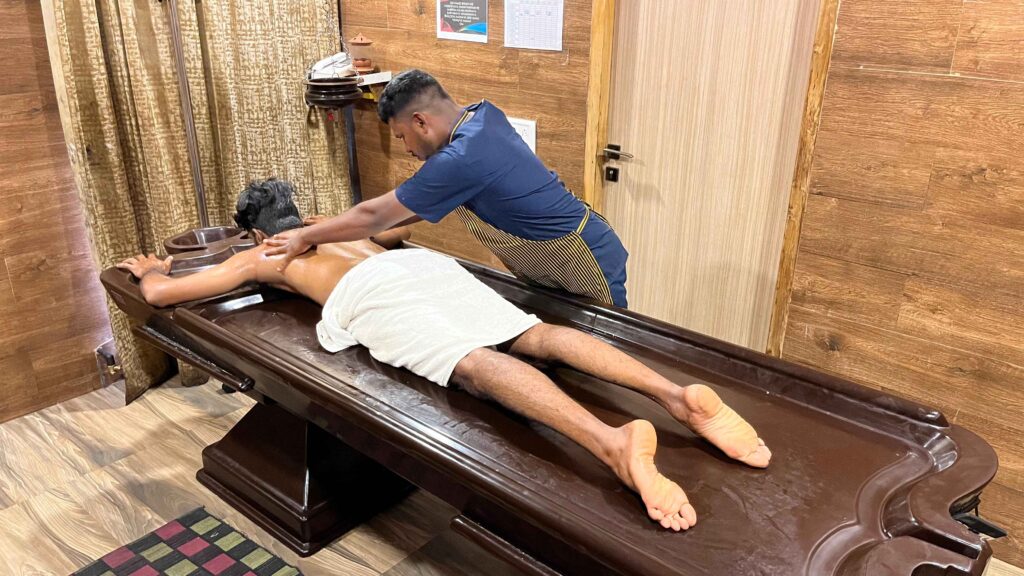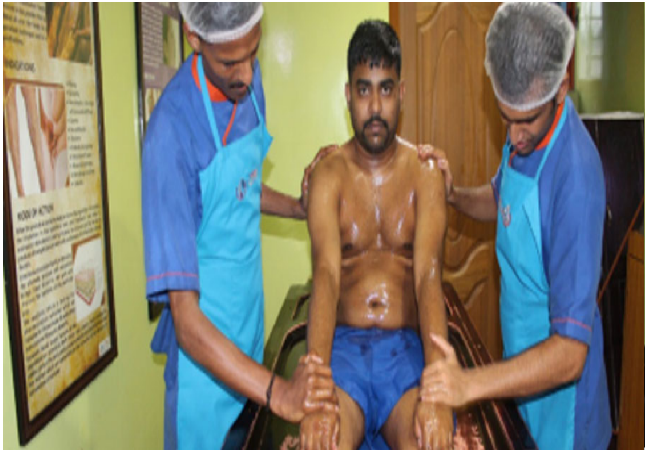
INTRODUCTION
Abhyangam is an Ayurveda classical massage therapy that uses warm, medicated oils. It differs from a regular massage by incorporating specific techniques and herbal oils personalized to individual needs.
The Benefits of Abhyanga are numerous; Abhyanga is known to eliminate fatigue, reduce mental stress, create lymphatic stimulation and, by so doing, assist with detoxifying the body, enhancing sleep, reducing anxiety, alleviating depression, promoting a feeling of well-being and contentment, and balances all the doshas.

Abhyanga is an ancient Indian Ayurvedic massage used for healing and detoxifying the body, mind and spirit.
The word ‘Abhyanga’ is composed of two Sanskrit words, Abhin means ‘towards’ and Anga, in one of its meanings, refers to ‘movement’.
Sarvanga Abhyanga is a synchronized massaging of the whole body towards the direction of the movement of arterial blood. In practical terms it means massaging the body in the direction of the bodily hairs. The scientific reason for this protocol may be to increase the blood flow towards the most distal parts of the body and avoid overwhelming the heart through increased venous return if the massage is done towards the heart, or in other words, in the direction opposite to that of the body hair.
BENEFITS
TREATMENT DURATION
40 TO 45 MIN
The treatment duration depends on the consulting physician and the severity of the condition
TREATMENT COURSE DURATION
Single day, 7 days, 14 days, 21 days
The treatment course duration depends on the consulting physician and the severity of the condition.
MODE OF ACTION OF SARVANGA ABHYANGA
When the Abhyanga starts, the medicines come in contact with the skin. The massage with a circular movement will stimulate lymph nodes, increases the lymph flow and relaxes lymphatic system by which it reduces blood pressure. It increase the blood circulation which brings toxins from all over the body to lungs through veins where fresh oxygen purifies blood and recycles it in the body. Thus it improves nutrition to cells and tissue and increases RBC.
Waste products like lactic acid & congestion of blood in exhausted muscle gets removed & they become refreshed. Proper Abhyanga removes dirt from skin, cleans millions of pores on skin & helps indirectly to action of lungs, large intestine & kidneys. Abhyanga works with fine network of nerves lying underneath skin & excites nervous system.
The two types of nervous system – Central & Autonomic works through the spine situated in Vertebral column, sending its offshoots to whole body through the opening in vertebrae’s. Abhyanga can bring about change & influence physical as well as emotional well-being of an individual.
INDICATIONS
CONTRAINDICATIONS
Fever: As the temperature might increase during the therapy
Rhinitis: Severity of disease will increase